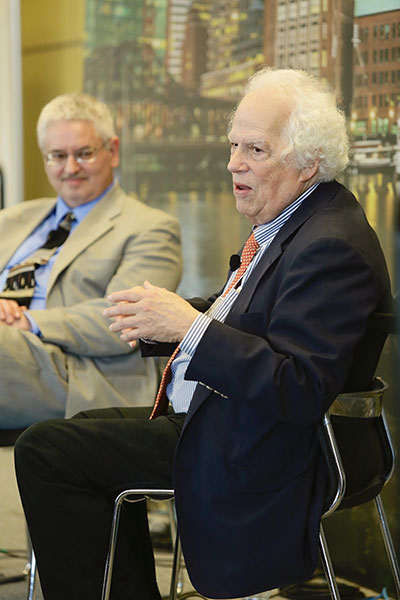Abridged from original article by Douglas J. Lanska, MD, MS, MSPH, FAAN published 13 July 2018 in World Neurology Vol 33 No. 3, History of Neurology
In an oral history interview for the American Academy of Neurology, conducted April 27, 2017, at the Boston Convention Center, I spoke with Nobel laureate Stanley B. Prusiner, the only living neurologist who has won a Nobel Prize. Prusiner was the sole recipient of the Nobel Prize in Physiology or Medicine in 1997 "for his discovery of Prions — a new biological principle of infection."

Here is an excerpt from that interview concerning the call at 5:05 a.m. EDT on Oct. 6, 1997, from the Nobel Committee, notifying Prusiner that he had won the Nobel Prize in Physiology or Medicine (Prusiner, 2014, p. 218). The call was from cell geneticist Nils Ringertz (1932-2002), professor and chair of the Department of Cell and Molecular Biology at the Karolinska Institute in Sweden, who was then-secretary of the Nobel Committee for Physiology or Medicine, as well as a member of the Nobel Foundation's Board of Directors.
Lanska: When you got the call that you had won the Nobel Prize, [what was] your reaction to that call?
Prusiner: First of all, my ex-wife [Sandy Turk Prusiner], who was my wife at that time, she got the call. She was in San Francisco, and I was in Bethesda at an FDA meeting. She got the call, then she told them where I [was]. Then, the guy woke me up. I knew him. I had met him. [He was] named Nils Ringertz.
He said, "Do you remember me?" I said, "Yes! We had dinner together six months earlier." He said, "Well, we've decided that we're going to give you the entire prize." That was really a surprise to me. I thought surely they were going to have some other people. And, you know … I was shocked because I knew people were nominating me for three or four years before that.
It was really nice, but it wasn't as though I was jumping up and down. It was just really nice that this had happened. I thought this is great.
People would ask me all the time, "How does it feel?" I would say, "You know, I recommend this." It's a nice thing to have happen to you.
Prusiner: I sat there, and I was sort of stunned. I was really stunned about the whole thing, about getting the prize alone.
Then I turned on CNN, and there was nothing about this Nobel Prize or any Nobel Prize at that moment. The time goes on and on, and I'm not finding anything, and I think this is a hoax, because I knew this had happened. It's not the first time some reporter called up and convinced somebody that they had been given the Nobel Prize. But this was not a joke. This was real. But I said, "I screwed up," because I should have said to Nils Ringertz, "I don't want to recite to you where I met you. I want you to recite to me where you met me, so I know it's you.'" I didn't do that. I said, "Well, alright."
Then, 7 a.m. comes, and there's nothing more on the TV. I turn on the radio. That I found a radio was amazing. The radio was on, and then there it's all laid out, and I said [expressing relief], "Oh, OK."
Skepticism Abounds
Prusiner's skeptical reaction that the call might be a hoax was certainly not unique among Nobel laureates. Many, if not most, Nobel laureates are initially skeptical. For example, Romanian-born German physicist Stefan W. Hell (Chemistry 2014) said, "The first moment I thought it was perhaps a hoax" (Hell, 2014). Similarly, British-American economist Sir Angus S. Deacon (Economics 2015) recalled: “they were very keen to make sure that I did not think it was a prank. I don’t know whether this is common. I’ve never had a prank phone call telling me that. And, of course, as soon as they said that, I thought, ‘Oh, my god, maybe it is a prank.’” (Dubner, 2015)
Several recipients have suspected that their students had orchestrated a prank. Australian physicist Brian P. Schmidt (Physics 2011) recalled, “I’m thinking, ‘Jeez, my graduate students are getting pretty good with the accent this year.” (Taylor, 2011) Likewise, American physicist Richard P. Feynman (Physics 1965) ruefully recounted:
“I thought it was some student calling as a prank. I wasn’t too polite. But after the third call I was convinced. I hope the guys who called will accept my apologies.” (Hendrickson et al, 1965).








